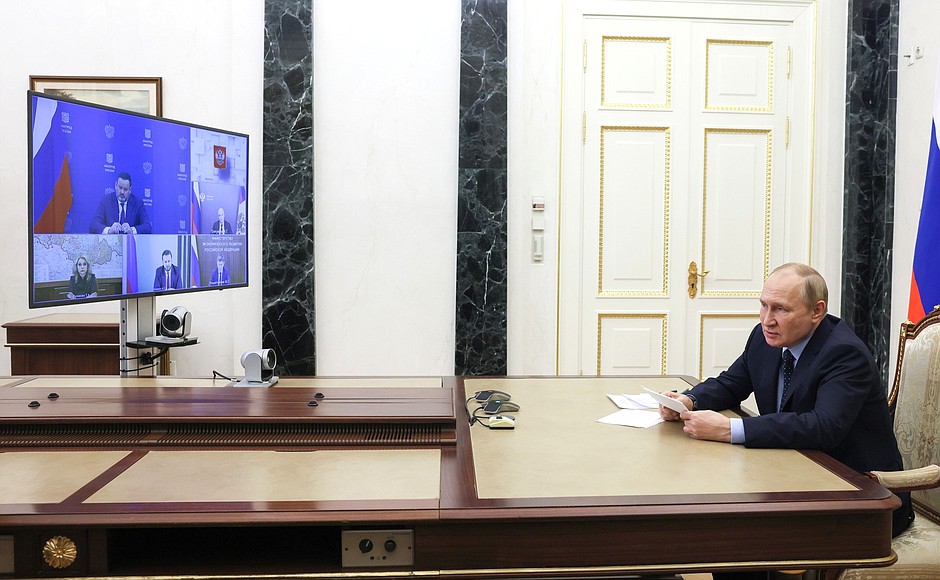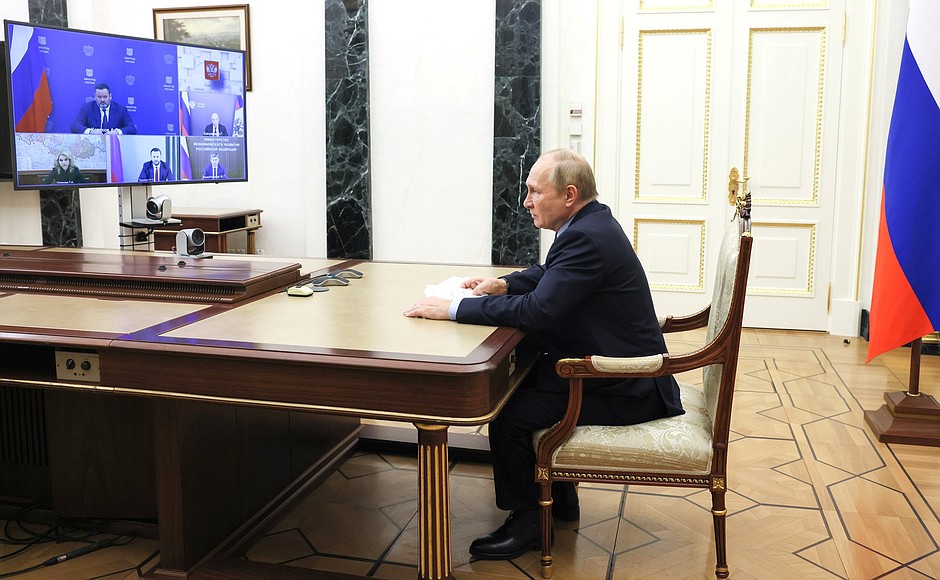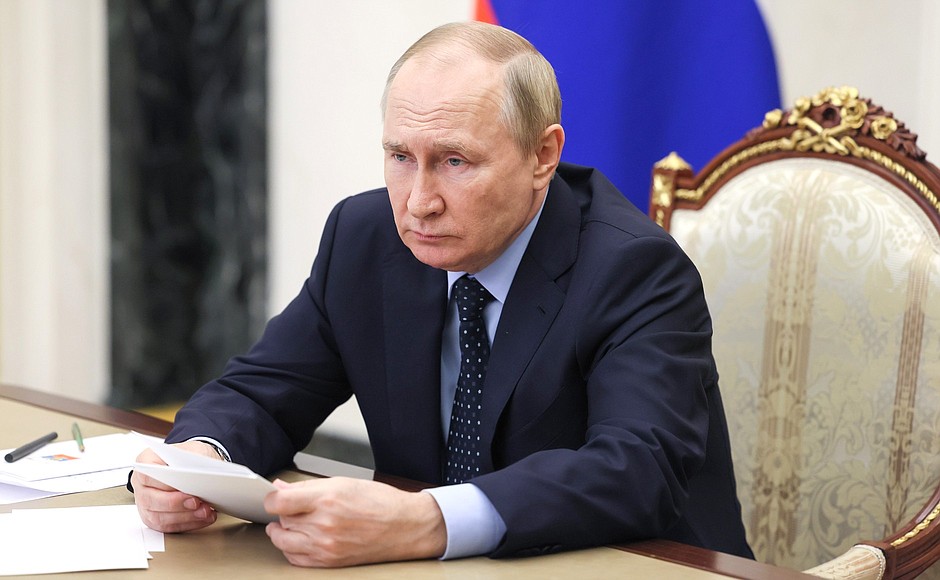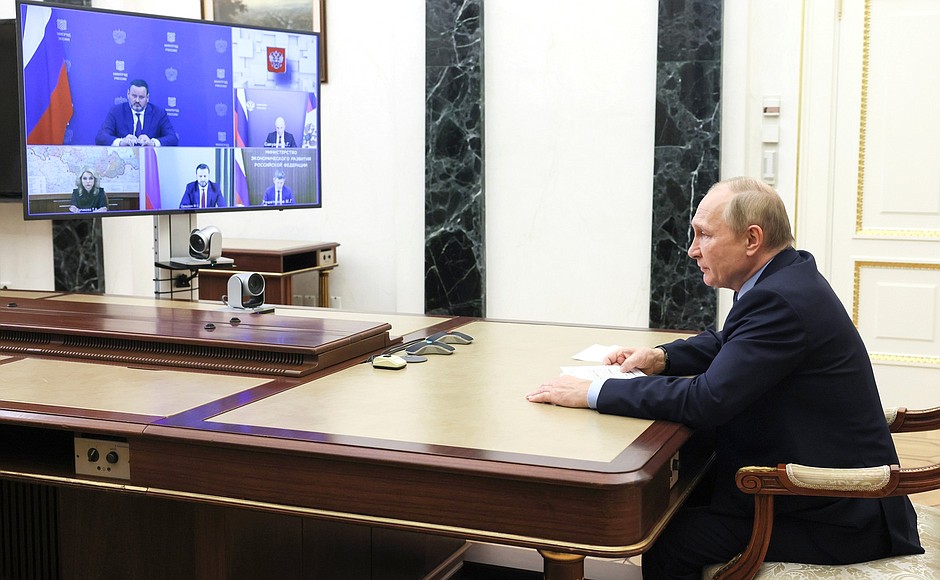Taking part in the meeting were Deputy Prime Minister Tatyana Golikova, Presidential Aide Maxim Oreshkin, Labour and Social Protection Minister Anton Kotyakov, Economic Development Minister Maxim Reshetnikov and Finance Minister Anton Siluanov.
* * *
President of Russia Vladimir Putin: Colleagues, good evening, hello.
I have said this many times and would like to repeat it now: despite today’s most significant events, and the specifics of the current situation, we, of course, should not forget about seemingly everyday things, things that are, of course, fundamental issues.
And today we will consider a very important, sensitive issue that is significant to millions of people in all Russian regions. We will talk about the income of families with children, about the dynamics of these incomes.
Among these things, I suggest analysing the support measures we already have in place and discuss ways to improve their effectiveness considering the current conditions in our demographics and in the economy, so that this state support becomes more significant, effective, and tangible for families.
Let me remind you that in 2020 the circle of maternity capital recipients was expanded. The right to this benefit was given to families with a first baby. Now about a million families receive maternity capital every year, and this programme has been extended until the end of 2026.
Over the past year we have developed and launched a comprehensive system of measures, from supporting expectant mothers until their child turns 17. We have discussed this with our colleagues from the Government and Ms Golikova many times; in fact, these were her ideas, and they are of course very timely. We need to create a comprehensive system. In particular, in April, needy families with children from 8 to 17 years old have received the right to monthly payments.
Again, the main goal of state support is to minimise the threat of poverty for Russian families, both those where a child is just being born and those who are already raising children.
At the same time, it is important to constantly analyse and adjust the system and see the overall picture. I do not just mean demographic processes but the state of labour markets in the regions and the dynamics of incomes and salaries in the economy, so that these parameters do not become restrictions when expanding the family and deciding whether to have a child or not.
I would like to note here that the current situation in the labour market is stable, and unemployment is at a minimum level of 3.9 percent.
As for salaries, in nominal terms the average monthly salary in the country increased by 12.7 percent in the eight months of this year. But we all understand that this does not mean much for an average person. An indicator of real salaries adjusted for inflation is more important. Here the situation is more difficult for objective reasons; right now, salaries are growing a bit slower than prices. We hope that with reduced inflation – and this trend has been recorded in the past few months – the picture will and should change for the better.
I will note this again – it is important to make sure that average incomes, especially for families with children, grow faster than inflation. I would like to emphasise once again that we are seeing a steady trend towards lower inflation, according to analysts and the Government. Specialists believe that in the first quarter of next year, it should be close to 5 percent or maybe even a bit less. We must see that salaries grow faster than retail prices.
I will recall in this context that starting January 1 of this year, the subsistence minimum in the country as a whole was adjusted by 8.6 percent. On June 1, we increased it ahead of schedule by another 10 percent. Thus, the social payments that are linked with the subsistence minimum in one way or another, were adjusted accordingly.
And, of course, it is necessary to create conditions where families can increase their incomes themselves. What am I referring to? First, parents can take on a new profession, upgrade their skills or get a well-paid job in the future.
Colleagues, I hope to hear today what is being done in this area. People need support from us, from the state, because they find it difficult to do it on their own. Let’s discuss this situation in detail, as a package, and review how our support measures for families with children are working in general and what additional steps and decisions are needed to improve them. I suggest discussing this whole package today.
I am giving the floor to Anton Kotyakov. Mr Kotyakov, go ahead, please.
<…>
Vladimir Putin: Here’s what I would like to say in conclusion. First, a few words about this new benefit that Mr Golikova has been talking about. This is new for the people but not for us. We have long worked towards creating this benefit, that is, a uniform system. Ms Golikova was basically the ideological inspiration for this uniform system several years ago.
Ms Golikova, when did we start talking about it, the need to create this uniform benefit?
Deputy Prime Minister Tatyana Golikova: We started talking about it in 2018 for the first time. First, we discussed the age from 18 months to 3 years, then from 3 to 7 years and finally from 8 to 17 years. You made the first global decision on this in early 2020, during your address to the Federal Assembly.
Vladimir Putin: I would like to emphasise this – it is a pretty long road to achieving the result that we are striving for and that we must reach next year. It took us several years to approach this result, and regardless of everything else, we must complete this work and launch this new system of support for families with children. We expect it to work well.
I would like to thank all of you for your detailed reports and to emphasise that it is necessary to continuously monitor the situation with people’s incomes, the incomes of families with children. This applies to all social issues in general, but families with children are still a special case – they require special attention and support. We must make well-considered, targeted and effective decisions in this respect.
I will repeat that this is a very sensitive and extremely important issue. This is about our demographic development, as Solzhenitsyn called it at one time – people saving, to ensure social justice and a reduction in poverty and inequality in our society.
This effort calls for the special attention and participation of federal government bodies and of our colleagues in the Russian regions. Of course, it requires the coordination of our efforts – otherwise it will never be effective, that’s for sure.
Colleagues, I would like to draw your attention to the following points.
First, as we agreed, and this was mentioned several times today, a uniform allowance for families with children from birth to 17 years will be launched on January 1, 2023. I would like to ask you to finalise all organisational issues, the accrual mechanisms and the payment of benefits. As Ms Golikova just said, when a new mechanism is launched, some hiccups can, of course, occur. It is necessary to monitor the process and make it all work properly and attentively monitor how this policy translates into practice.
I will note some essential requirements. First, the paperwork and the process of receiving this uniform benefit should be as understandable, simple and convenient for people as possible. People should have all the information they need to do this. And of course, these benefits should be a real support for families.
Second, as I said in my opening remarks, we need to create the necessary conditions to increase the incomes of families with children, that is, real income, so family budgets can become more sustainable.
And in this regard, I would like to ask the Government to submit several new proposals. What do I mean? I mean proposals for a faster increase in the minimum wage, among other things, so that it substantially exceeds the subsistence minimum (I know that this is being discussed in the Government), so that this gap will increase. In order for real incomes to grow, the difference should favour the real incomes of our people.
I would like to elaborate separately on a specific life situation. When parents start working or their earnings increase slightly, families might lose the right to these benefits for their children. At the same time, despite their salary, the total income of the family remains low and may even be lower than that received from the benefit.
We need to create additional opportunities and incentives for parents to go to work, improve their skills and master new, well-paid professions. We need to support those who want to earn more.
It is clear what I am talking about. I know that you are working on this. There are various ways to address this issue: either make income tax adjustments so people pay less taxes if total income falls, or pay them a partial benefit. Various approaches can be used, and I know that you are working on this, but please do not delay; agree on an approach.
Russian families, youth, young men and women who are just starting their adult lives, must be sure that our measures to support families, fatherhood, motherhood, and childhood are guaranteed by the Russian state for years to come, no matter what. And we can only increase, expand, or improve them, despite the current difficulties and challenges. We will do this consistently.
We are talking about the future of Russia, and we all understand this very well.
I would like to once again thank you for your work and ask you to focus on these fundamental issues no matter what.
Thank you very much. All the best.








